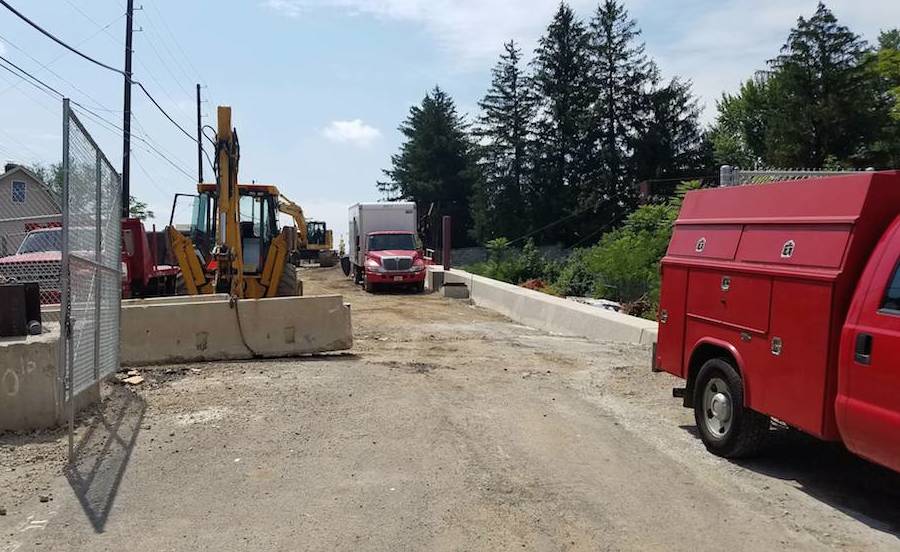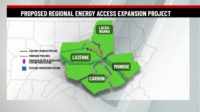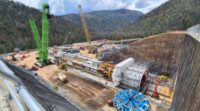The agreement includes a 12.5 percent increase in the Petroleum Products Gross Receipts Tax, a four-cent diesel surcharge and a seven percent tax on non-motor-fuel petroleum products to fund the TTF, which has essentially run out of money for new transportation projects after years of over borrowing. The new gas tax revenue would cover old debt payments, freeing up $347 million from the general fund for other needs.
If passed along to motorists, the gas tax would increase by 23 cents a gallon. An estimated 35 percent would be paid by out-of-state motorists. The dedicated revenue would generate $1.2 billion annually, which would support $2 billion in infrastructure investments each year.
A sustained investment of $2 billion annually would produce an estimated $4.7 billion a year in economic activity and create more than 34,000 jobs directly and indirectly, with annual payrolls of $1.4 billion. Each dollar spent from the TTF generates $2.35 in economic activity.
The plan also includes five tax cuts worked out over the past several months during ongoing negotiations involving Democratic and Republican lawmakers from both the Senate and the Assembly. The plan does not include any changes in jet fuel taxation.
- See more at: http://senatorsweeney.com/press/sweeney-prieto-announce-agreement-plan-renewed-transportation-trust-fund/#sthash.ZO3ZNq8k.dpufThe agreement includes a 12.5 percent increase in the Petroleum Products Gross Receipts Tax, a four-cent diesel surcharge and a seven percent tax on non-motor-fuel petroleum products to fund the TTF, which has essentially run out of money for new transportation projects after years of over borrowing. The new gas tax revenue would cover old debt payments, freeing up $347 million from the general fund for other needs.
If passed along to motorists, the gas tax would increase by 23 cents a gallon. An estimated 35 percent would be paid by out-of-state motorists. The dedicated revenue would generate $1.2 billion annually, which would support $2 billion in infrastructure investments each year.
A sustained investment of $2 billion annually would produce an estimated $4.7 billion a year in economic activity and create more than 34,000 jobs directly and indirectly, with annual payrolls of $1.4 billion. Each dollar spent from the TTF generates $2.35 in economic activity.
The plan also includes five tax cuts worked out over the past several months during ongoing negotiations involving Democratic and Republican lawmakers from both the Senate and the Assembly. The plan does not include any changes in jet fuel taxation.
- See more at: http://senatorsweeney.com/press/sweeney-prieto-announce-agreement-plan-renewed-transportation-trust-fund/#sthash.ZO3ZNq8k.dpufThe agreement includes a 12.5 percent increase in the Petroleum Products Gross Receipts Tax, a four-cent diesel surcharge and a seven percent tax on non-motor-fuel petroleum products to fund the TTF, which has essentially run out of money for new transportation projects after years of over borrowing. The new gas tax revenue would cover old debt payments, freeing up $347 million from the general fund for other needs.
If passed along to motorists, the gas tax would increase by 23 cents a gallon. An estimated 35 percent would be paid by out-of-state motorists. The dedicated revenue would generate $1.2 billion annually, which would support $2 billion in infrastructure investments each year.
A sustained investment of $2 billion annually would produce an estimated $4.7 billion a year in economic activity and create more than 34,000 jobs directly and indirectly, with annual payrolls of $1.4 billion. Each dollar spent from the TTF generates $2.35 in economic activity.
The plan also includes five tax cuts worked out over the past several months during ongoing negotiations involving Democratic and Republican lawmakers from both the Senate and the Assembly. The plan does not include any changes in jet fuel taxation.
- See more at: http://senatorsweeney.com/press/sweeney-prieto-announce-agreement-plan-renewed-transportation-trust-fund/#sthash.ZO3ZNq8k.dpufOne month after New Jersey Gov. Chris Christie ordered work on at least $3.5 billion in "non essential" state-funded infrastructure projects halted as its transportation trust fund emptied and politicians battle over a gas tax hike to refill it, a resolution remains elusive.
Legislators had reached a tentative deal on July 22 to enact a previously proposed 23¢ gas tax hike that would restart hundreds of road and rail upgrade projects the state furloughed. But Christie tersely termed the tax hike—coupled with cuts in other unrelated state taxes that did not include his proposed 1% sales tax reduction—"dead on arrival."
The anticipated hike would raise $1.2 billion in new revenue for the trust fund, which was set to run dry next month, and give the state $20 billion for road, bridge and rail construction over the next decade, combined with other borrowing, say local media reports. New Jersey's 14.5¢-per-gallon tax, now second lowest in the US, would rise to 37.5¢.
State Senate President Steven Sweeney (D), who had opposed the sales tax reduction, said in a statement that the latest "bipartisan plan... will allow us to meet the state’s pension obligations without creating a fiscal crisis." He also is a vice president of the ironworkers' international union.
But a spokesman for Christie said that legislators "have not shared the specific details of their joint proposal with the governor beyond the vague generalities contained in their press release.” The details of Christie's counterproposal also were not disclosed.
"Idling thousands of workers by shutting down highway projects hurts the state's economy as well as its infrastructure," said the Philadelphia Inquirer in an Aug. 2 editorial. "It's time to end the detours and delays that have made traveling in New Jersey more hazardous and slow."
"it is imperative that contractors continue to make their voices heard in every legislative office across the state until the bill is signed," said the New Jersey Transportation and Utility Contractors Association last month. "It’s time to stop the stalemate."
The shutdown of some 900 road projects and hundreds more transit infrastructure and equipment upgrades has idled at least 1,700 construction workers and was estimated to cost $41 million in its first week and possibly $9 million more for each additional week after, said the American Road and Transportation Builders Association in a July 11 analysis. Municipal officials predicted project costs could rise by up to 25%.
“Whether or not [firms] will be reimbursed by the state, the governor has not said,” ARTBA noted. “This could have a significant negative impact for smaller companies that do not have a large cash reserve.”
The state trust fund expired on June 30, with funding left only through early August and existing debt payments still to be made. Projects that are funded by agencies such as the New Jersey Turnpike Authority and with federal support, such as the $1-billion Pulaski Skyway reconstruction in Jersey City, continued.
Caught in the middle are town officials and contractors with dormant projects and rising expenses, as well as hundreds of idled construction workers and other employees doing related work in peak season.
“We have received no guidance from the state about when the state shutdown will be lifted,” says Michael Cerra, assistant executive director of the New Jersey State League of Municipalities.
Cerra confirms media reports that some municipalities are defying the shutdown—and risking state cost reimbursement—to continue work on contracted projects “because of urgency or other factors.”
But there is speculation on whether contractors would sue state and local governments for breach of contract on halted projects. Anthony Attanasio, executive director of the New Jersey Transportation and Utility Contractors Association, says the shutdowns could amount to “defensible delays.”
In a letter to the state DOT, the league asks whether Christie’s order “nullifies” contracts on shuttered projects and “shields” towns from legal action. Cerra told ENR on July 25 that the group had yet to receive a response.
Anthony Attanasio, executive director of the 1,100-member state transportation contractors group, says the shutdowns could amount to "defensible delays."
But neither Cerra nor Attanasio were aware of contractor legal action.
"The worst part is that everyone agrees on the solution," says Attanasio, noting that the key disagreements are over the non-transportation-related tax issues.
Attanasio had been concerned that, if the trust fund runs out before there is a compromise, even projects with other funding might have to be shuttered because of salary and other cost impacts. "This is an escalating crisis, but I'm hopeful there's a deal to be reached," he says.






Post a comment to this article
Report Abusive Comment